

ARC Forum on Faith - Archive 2022


ARC Forum on Faith - Archive 2022
SITE INDEX
Top of Page
The pictures found on this "Forum on Faith" page were either found published
on a web site or provided by the author. If authors prefer to supply a picture instead of the one used,
please send it as an attachment to donlav@eternal-now.org. 
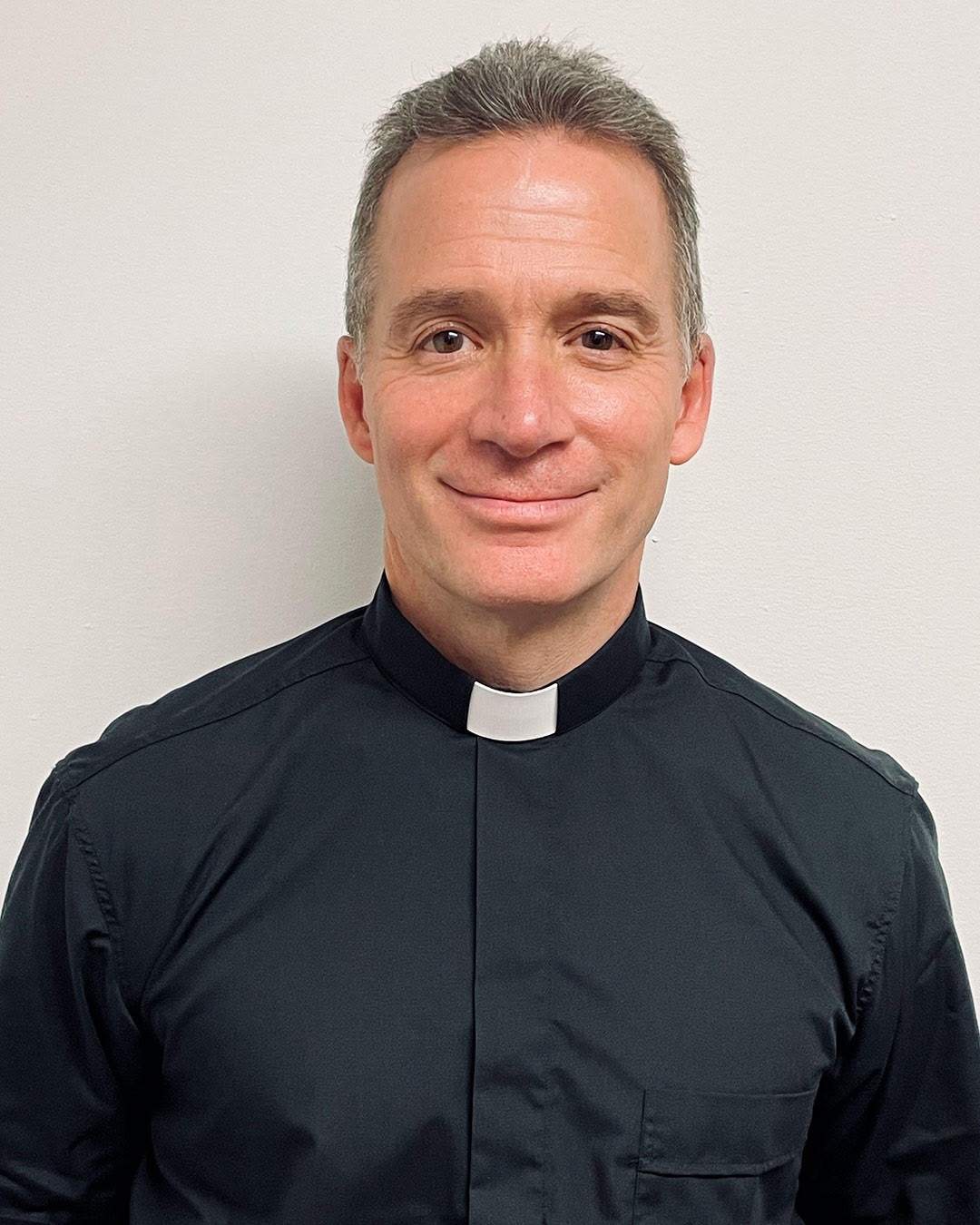
Rev. Father Dunn
FORUM ON FAITH
God Calls the Unlikely.
Rev. Father Dunn
Published: December 17, 2022
Danbury News Times
When I told my family I was thinking about becoming a Priest, they all laughed. They thought I was joking. Afterall, I wasn't very holy, had many girlfriends, was a life-long stutterer, and never mentioned any interest in the Priesthood before. I can't blame them for laughing, for I was the most unlikely candidate for the Priesthood.
When I was 24 years old, everything was going great in my life. I had a job counseling troubled teens and was going for my masters in counseling. I had a nice girlfriend and just bought a new car. A friend and I were planning to get and share an apartment or condo. I would say I had it all, but I just wasn't happy. I wasn't at peace and didn't know why.'
Out of the blue, a friend of mine told me about a pilgrimage to Medjugorje in Bosnia and Herzegovina that he and his sister were going on and they wanted me to join them. Supposedly Mary, the Mother of God, was appearing to children in this town and people were claiming that many miracles were taking place there. I wasn't very religious at the time, and never went on a pilgrimage before, but it sounded interesting- maybe I would see or experience something supernatural! A couple days before the trip, my friend and his sister pulled out of the trip and I was going to do the same, but then my parents decided to take their spots. Just what I wanted to do- go on a pilgrimage with my parents. Don't get me wrong, I love my parents dearly, but you know what it's like to be 24.
On this pilgrimage I didn't see or experience anything supernatural, but something about the place was so peaceful and powerful. At one point on a mountain I prayed, "God why am I not happy and what do you want me to do with my life?" Later on, I had the urge to go to confession - which was surprising because I hadn't confessed my sins to a Priest in quite some time. I looked for a Priest who spoke English, and unloaded all my sins on him. After confessing I started thinking, "Does God even know I'm here, and how can He love me with all these sins?" Suddenly, this priest I never met before said, "Michael, God loves you and is so happy you're here." What?! Was he a mind reader and how did he know my name?! I was filled with such indescribable peace and joy, it felt like a miracle was taking place inside me. I was walking on air the rest of the day.
After returning home I lost interest in everything. All I could think about was God and the Catholic faith I was brought up in. After consulting with my local priest for a while, I decided to look into the Priesthood and tell my "laughing" family. I entered the Seminary with both apprehension and many fears- that is, I was just a regular guy, not very holy, and did I really want to go back to school for 5 more years (I wasn't a great student either)? Also, first and foremost, I was a severe and lifelong stutterer-how can I get up in front of large crowds and preach?! In the Old Testament Scriptures there's a story about how God spoke through a donkey that was owned by a man named Balaam. I thought, this being true, maybe He can speak through me.
God came through and helped me conquer and overcome all my worries and fears. I learned that wherever He calls you, He'll give you what you need. With God's grace and help, we can do or accomplish anything. I also realized that His plan is, not just for Him to accomplish His purpose, but for your happiness and joy. I believe that God deeply loves all of us and has a plan for us all. I've been a Priest for 28 years and am now the Pastor of the Parish I grew up in- St. Gregory the Great in Danbury. Back in the day if someone told me that I would one day be the Pastor here, I would have laughed too. Indeed, God calls the unlikely.
Rev. Father Dunn, Pastor, St. Gregory the Great Parish, 85 Great Plain Road, Danbury CT 06811 - 203 797-0222
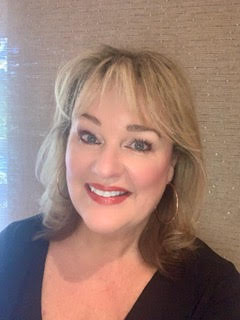
Rev. Dr. Kathleen Rudoff
FORUM ON FAITH
The Gift of Humility - for yourself and others.
by Rev. Dr. Kathleen Rudoff
Published: December 3, 2022
Danbury News Times
I have been inundated of late with emails and social media ads from companies claiming to have the perfect gift that I should be giving this holiday season: the perfect gift for the person that has everything, the perfect gift for the environmentally conscious, the musician, the tween, the athlete, the creative child, and so on! I seriously doubt there's such a thing as a "perfect" gift. But I have been thinking about a gift that is sorely needed and often overlooked. It's the gift of humility, and it's not an easy one to acquire, or to give. You don't have to look too far to see that it's in short supply these days.
It can be hard to be humble when living in a society that prides itself on competition and the idolatry of individuality. It's even more difficult when you think you already have all the answers. Just think of how the word humility is most often used: defined negatively as a low view of oneself. In the corporate world, assertiveness and authoritativeness are so highly valued, humility is mistakenly viewed as a sign of weakness. But the world's religions have a great deal to say about humility. Jesus taught in Matthew 5:5, "Blessed are the meek, for they shall inherit the earth." The Koran tells us "Successful indeed are the believers who are humble in their prayers ... In the Jewish tradition, humility is among the greatest of the virtues. Hinduism's Bhagavad-Gita tells us to "Be humble, be harmless, have no pretension." An Ojibway storyteller writes about what humility means in that native tradition: "The old ones say humility is the foundation of everything, Nothing can exist without it. Humility is the ability to see yourself as an essential part of something larger . . . It teaches us there are no greater or lesser beings or things. There is only the whole . . .". No matter our religious background or affiliation we are called to have humble hearts.
One of my Unitarian Universalist colleagues has posited that humility is a way of holding oneself that creates space for others, that allows others to breathe. It's an open, inviting, welcoming way of engaging others. I recently came to realize that it was my own lack of creating space that caused me to make assumptions about a group of people and kept me from being in right relationship with them. That's what assumptions do; keeping us from relationships of mutual respect and compassion. My assumptions, stemming from a lack of humility, were a barrier I had to dismantle. Every one of us runs the risk of making assumptions about other people, about intentions, and about expectations. But we can learn to be humble and accept the gift for ourselves while offering it to others by acknowledging our own limitations, appreciating others, and rediscovering a sense of wonder. After all, the jaded "I've seen it all" attitude makes us feel far more important than we are, and the truth is that nobody has actually seen it all, done it all, or knows it all!
Humility is a core issue for our nation, for our individual relationships, and for our religious communities. In our work for social justice there is a place for humility as well, for when you're humble you bring the best of yourself to the table while empowering others to do the same. Begin sharing that gift of humility with awareness of your own assumptions, limitations, and achievements. Humility allows you to be honest with yourself and is a manifestation of love. It is how resilient community is built through strengthened relationships and deeper dialogue.
I have come to see and experience humility as profound reverence for every person & all living beings. It has been said that the first test of a great person is their humility. The English philosopher John Ruskin said the first test of a great person is their humility. It's a curious feeling that the greatness is not of them, but through them. And they see something divine in every other person and are endlessly, foolishly, incredibly merciful. I can't think of a more perfect gift! May you give and receive humility in abundance this season and beyond. Truly blessed and duly grateful,
Rev. Dr. Kathleen A. Rudoff, Minister, Unitarian Universalist Congregation of Danbury, CT. Faculty, Claremont Lincoln University, CA. Cell: 619-609-6929
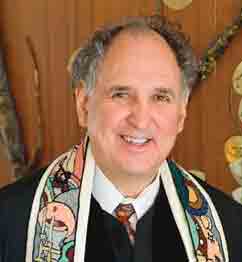
Rabbi Jon Haddon
FORUM ON FAITH
Interfaith Thanksgiving celebration helps us show gratitude for community.
by Rabbi Jon Haddon
Published: November 19, 2022
Danbury News Times
A Season of Giving and Generosity
There is a wonderful old baseball story that recalls that Lefty Gomez, who pitched for the Yankees in the nineteen thirties, held the World Series pitching record of six wins and no losses. One day he was asked by a sports writer for the secret of his success. He replied, Clean living and a fast outfield. The point is that no pitcher gets a no-hitter without the good fielding and batting of a superb outfield. Similarly, no one has ever achieved anything worthwhile without the help of many others.
We are so fortunate to live in a community that is committed to helping others. On Monday, November 21st (7:00pm) the Associationof Religion Communities will be hosting a community wide interfaith celebration of Thanksgiving at the New Hope Baptist Church (12 Dr. Aaron B. Samuels Blvd.). Priests, Ministers, an Imam, Rabbis, Cantors, and laymen will be participating. very much hope that you, the members of our Greater Danbury community will attend, along with your children. This is the first "in person" community worship service since 2019.
Thanksgiving is an opportunity to express our gratitude for this remarkable community of Danbury, for its wonderful schools, restaurants, businesses, its natural beauty, and, most important, for those in our community who work for the betterment of all. But it wasn't just an economic system and trade with the Native Americans that allowed the Pilgrims to prosper. It was their devotion to God and His laws. And that's what Thanksgiving is really all about. The Pilgrims recognized that everything we have is a gift from God - even our sorrows. Their Thanksgiving tradition was established to honor God and thank Him for His blessings and His grace.
ARC's Executive Director, Rabbi Ari Rosenberg, recently noted: "We are grateful for the ability to have already placed 39 homeless residents of the greater Danbury area into permanent supportive affordable housing units. We are grateful for the opportunity to have helped over 200 families embrace a future free from domestic violence. We are grateful for the blessing to provide a cornucopia of fresh fruit, vegetables, meat, dairy and dry goods to over 1500 people. And that's all just within the last four months!" When you attend this interfaith worship service you, too, will be involved in supporting ARC's Domestic Violence Prevention Program, Comida Food Pantry, Urgent Assistance, Interfaith Peace Camp, and Homelessness Support Systems.
We can't wait to see you when we gather for ARC's Interfaith Thanksgiving Service. The offering will be equally distributed between the Ukrainian Red Cross and ARC's general fund. Please join us November 21 (7:00pm) at the New Hope Baptist Church!
Rabbi Jon Haddon
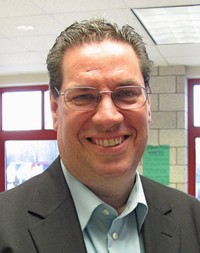
Rev. John Parille
FORUM ON FAITH
A Season of Giving and Generosity.
by Rev. John Parille
Published: November 5, 2022
Danbury News Times
A Season of Giving and Generosity
In just a few short weeks we will be once again enjoying a national holiday, Thanksgiving. The Thanksgiving holiday has some deep roots here in the United States that are in English traditions. The Bible tells of special days that were set aside in the Old Testament to offer up thanks for special blessings that were viewed as coming from God. The annual Thanksgiving tradition that we celebrate here in the United States is documented as early as 1619. Our familiar traditions can be traced to the pilgrims and the Puritans who came here from England. Historians tell us that in 1621 in Plymouth Massachusetts, Thanksgiving was prompted by a great harvest.
If you talk to family and friends of Thanksgiving, the conversation will of course turn to turkey, stuffing, pumpkin pie, and a good pair of comfortable sweatpants to lay on the couch in after the meal is over. However, Thanksgiving is typically the launch point for what is commonly known as the "Season of Giving."
During the holiday season, there are many opportunities and invitations to practice giving and generosity. Familiar sights such as red kettles with bell ringers, drop off points for toy drives, and many opportunities to donate items to the local food bank. There is no denying that the spirit of giving and generosity is at an elevated level during this time of year.
Sadly, once December 26 shows up, this wonderful spirit of generosity seems to disappear faster than the Christmas leftovers. Imagine what might happen in the world, in our country, in our state, in our town, and in our own neighborhoods if we could change the way we think about generosity.
Do not get me wrong, I am always amazed how generous and giving people can be at this time of year. I just wonder what we could do to keep this spirit of generosity rolling through the entire year instead of just a few weeks.
In Second Corinthians, Chapter 9:6 it states, "Remember this: whoever sows sparingly will also reap sparingly and whoever sows generously will also reap generously." Verse 11 says, "You will be enriched in every way so that you can be generous on every occasion, and through us your generosity will result in Thanksgiving to God."
What would our lives look like if we had the mindset to be generous on every occasion? How might you define being generous? Do you immediately think of what might come out of your wallet or your pocketbook? This scripture says that we will "be enriched in every way" which tells me we should not limit our thinking to just money when we think of being generous.
We can be generous by giving our time to volunteer to an organization that is making an impact in blessing others. We can be generous with our compliments to the people that we encounter. We can certainly be generous with acts of kindness, words of praise, and showing love and forgiveness, especially to those who may have hurt us in our past.
I believe that God is probably not all that impressed or interested in how much we give while we journey down this road, we call life. God is always looking at our hearts which means he is more interested in why we may be generous. In the book of Matthew chapter 6:21 it says, "Where your treasure is, there your heart will be also."
I believe that God is always calling us to be mindful of others, especially those who are less fortunate than ourselves. Maybe generosity has nothing to do with an amount but more to do with our attitudes. This is why when we give of ourselves and offer things that money cannot buy like our time and our love, God sees a heart that is filled with compassion, generosity, and of course gratitude to the Lord for all that He has done. A slight change of thinking on generosity can change everything!
May you be blessed abundantly during this wonderful season of giving, generosity and of course Thanksgiving!
Rev. John Parille, Senior Pastor, Bethel & Long Ridge United Methodist Church.
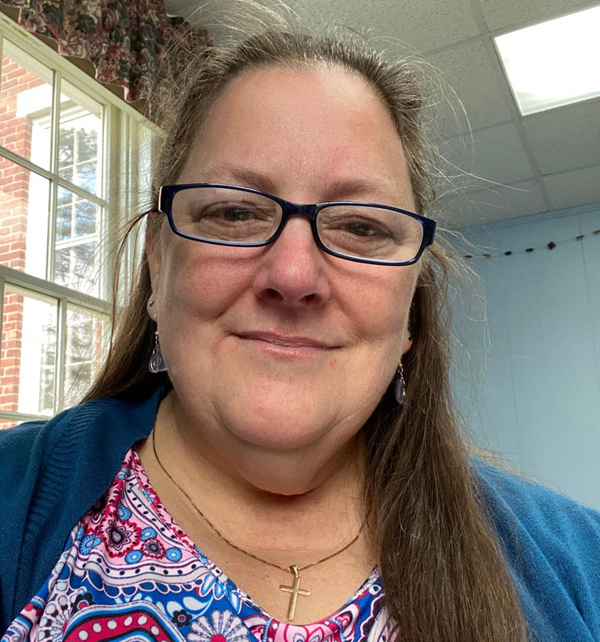
Rev. Liz Yoho
FORUM ON FAITH
Service is an Essential Spiritual Practice.
by Rev. Liz Yoho
Published: October 15, 2022
Danbury News Times
Spiritual practices are ways that we all engage with our faith. The spiritual practices that I incorporate into my life include worship, centering prayer and meditation, keeping a gratitude journal, and service.
They allow me to be open to my Creator who I call God. It is essential for me to be in relationship with God and regular practices keep me connected. Service to others is a way that I create space for God's spirit to work through me. Service also allows me to explore, strengthen, and even find gifts that I was not aware I possessed. When I step out of my comfort zone and into a place where I am faced with the needs of others, I can more greatly rely on God. I remember where my blessings come from, and it is not from me! I am humbled by the fact that all I am, and all that I have, are the generous gifts from God.
Service takes on many different forms in my life. I reflect on the Gospel message of Matthew 25 encouraging us to give food to the hungry, give drink to the thirsty, welcome the stranger, clothe the naked, take care of the sick and visit those in prison. These are essential needs for all of us, and so I share my gifts with my church and community. After a two-year hiatus due to Covid, our church resumed its annual trip to Appalachia to repair homes for families in need. We work with Appalachia Service Project (ASP) to make homes warmer, safer, and drier.
This year I accompanied 21 other youth and adults to the Charlestown, West Virginia area. We trained in the spring to learn construction skills but that is not all that is necessary. ASP considers itself to be a relational ministry with construction on the side. That has great meaning for me, and it is an important part of living out my faith. Community is essential, so we learned about stereotypes, stigma, and humility. We talked about the hospitality we would receive and the grace we could offer the families. We were welcomed into the homes of those we served. We practiced deep listening and being nonjudgmental. It was important for me to be in relationship and open to God's direction in our interactions. Managing the weeklong trip can be complicated and stressful at times, but I have used my gifts of flexibility, patience, and trust in God to help make the experience fruitful for all our volunteers.
The same welcome and openness is necessary in working at Dorothy Day Hospitality House in Danbury. I have learned much in serving the people that come to the kitchen. First and foremost, I was taught that each person is considered a guest and is welcomed in that manner. Remembering the scripture from Hebrews 13, "Do not neglect to show hospitality to strangers, for by doing that some have entertained angels without knowing it," is a part of the culture at Dorothy Day. I do my best to recognize the divine in each person that is served. This opportunity reinforces the call to serve and support others on their journeys, just as I am continuing my own spiritual path. Taking the time to talkand share with our guests at the kitchen allows me to be present to God's movement and presence in myself and others. I never leave the kitchen without my heart filled with love.
This summer I embarked on a new service opportunity for our church. We are working in collaboration with Central Christian Church in Danbury to offer support to families in the local community. The program is called Mother's Love and its mission is to work with single mothers to enhance, uplift and strengthen their lives. Over the summer we provided perishable food and diapers each week. This fall we continue to offer diapers and hope to create a cohort of mothers and caregivers to meet for discussions, peer support and to identify the needs of this community. This service gives me an opportunity to learn and grow. Hopefully my sharing will help to facilitate the creation of a place of caring and support for the moms and children of our community. In these service opportunities I experience God's love and am blessed with the chance to share that with others. For all this I am grateful.
Rev Liz Yoho, Pastor, Congregational Church of New Fairfield, CT.
pastor@ccnf-ucc.org.
www.ccnf-ucc.org
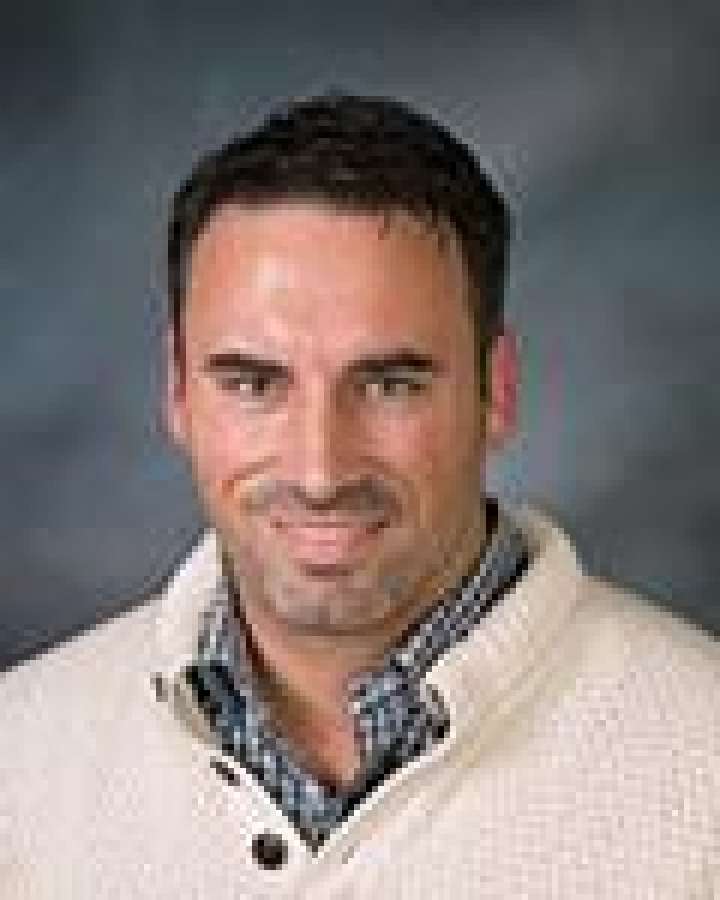
Rev. Stephen Tickner
FORUM ON FAITH
Struggling Into the Practice of Silence and Deep Listening.
by Rev. Stephen Tickner
Published: October 1, 2022
Danbury News Times
There is a Yiddish proverb that says, "We Plan, God laughs."
Over the summer I was blessed by Central Christian Church of Danbury to be granted a pastoral sabbatical. I was excited about having some quality time for rest, reflection, and restoration. Since my daughters would be out of school for the summer, we packed our bags and headed to Spain.
I had three personal goals for this time - to learn Spanish, to have quality family time, and to experience restoration by focusing on my spiritual center and relationship with God.
The first goal was met easily. My wife and I spent eight weeks in a classroom learning Spanish. I can't say we are fluent but we have a good start.
The second goal was met simply by being in close quarters together in a foreign country. We got to travel to fun places, learn a new culture, and find new and unique ways to get on each other's nerves. It was a precious time for us.
The third goal was a bit trickier. In order to find the restoration I desired I mapped out a plan, created tasks to accomplish, and set a deadline for completion.
I planned, God laughed.
Fairly quickly I found daily life consuming a good chunk of my time, a physical body that wasn't cooperating thanks to an injured lower back, and even a strong internal resistance every time I was able to act on my plan.
I was frustrated and even angry that my precious time wasn't going the way I wanted.
Thankfully, I have a wise spiritual director. When I described my frustrations to her, she counseled me to "let it all go." Pray, listen, and just be with God.
Her instructions provided a sense of relief, but they weren't easy. I am a doer. I like crossing items off a to-do list.
Instead, I was being directed into a time of silence and deep listening.
Ditching my plans, I devoted myself to engaging in two ancient Christian monastic practices with roots reaching back to the desert monastics - Centering Prayer and Lectio Divina.
Centering prayer is a contemplative practice whose sole purpose is to quiet the mind and center oneself in the presence of God.
In short, the prayer is rooted in the contemplative idea of "resting in God." Practitioners of this prayer believe that God's divine presence lies deep within us, closer to us even than our breath.
With that in mind, we sit in silence with eyes closed for twenty minutes. Because we are human, we will undoubtedly find ourselves caught up in a thought or a feeling. Whenever this happens, we let the thought go by returning to a sacred word, usually a name for God that we have agreed to use beforehand. This word serves as a symbol of our consent to God's presence and action within.
Centering Prayer is a practice of silencing our overactive minds in order to center our beings in God;s presence. Over time, the practice builds in us an awareness that allows us to find the quiet centering throughout our daily lives.
The second practice I engaged in was Lectio Divina, Latin for "divine reading."
Through an attentive, slow, and repetitious reading of scripture, Lectio offers an immersive and deeply personal experience focused on listening. We listen for the personal message the Spirit is sending us through this particular piece of Scripture. It's not a study of Scripture, it is a deep listening for the Spirit of God through Scripture.
What makes Lectio engaging for me is that it also invites me into conversation with God by responding to what I do or do not receive. How do I feel about it? What questions do I have? Am I able to live it? The important thing is not to edit my response - a relationship requires honesty and it is no different with the divine.
I am then invited into an extended period of contemplation. I allow the experience to live with me throughout the day while continuing to listen for a deeper response or understanding.
Sometimes conflict and struggle can lead to greater understanding. I was frustrated and angry when the plans for my sabbatical weren't going the way I planned. However, through this frustration I was led to these practices which allowed my spiritual life to come alive in new ways.
My plan is to continue these practices. I wonder how God will laugh this time.
Rev. Stephen Tickner, Pastor, Central Christian Church of Danbury, Ct. Email: rev.stephen@cccdanbury.org

Pastor Brandon Whitfield
FORUM ON FAITH
The Pandemic Pivot.
by Pastor Brandon Whitfield
Published: September 16, 2022
Danbury News Times
The Pandemic Pivot: I am remonetizing the sight of beautiful trees, a cool breeze, and colonial homes. These are the first thoughts that come to mind when I think of Connecticut. A far different description of my hometown. I grew up in the rural countryside of North Caroline. The trees were evergreen, the tea was sweet, and the culture was hospitable. Imagine my surprise when I began to develop a desire to start a new church in the New England state. I had the privilege of forming a small bible study group on my college campus while earning my undergraduate degree in broadcasting. This small, diverse group that met weekly was a challenge to maintain. I struggled to gain consistent commitment from those involved, and the workload often fell on me to carry out on my own. I knew how challenging it would be to begin a group like this. Yet here I was, planting a new church in a new city with few resources and very few people.
I'm not, by nature, a risk taker. I like the known, secure, well-planned day and future. I don't believe God is limited to our thinking, concerns, or even the actions of others in our lives. His ways are bigger and better than ours, and His faithfulness is beyond our comprehension. I believe God is like a GPS - either confirming that we are on the correct route or redirecting us to His best plan - His bigger Yes. His Yes, His will, is based on His good plan for our lives and not on our limited view or perspective, past, emotions, or fears. It was vital for me to know this because God would lay the foundation of our church during the challenging times of the COVID-19 pandemic. As if the pandemic wasn't complicated enough, my wife and I suffered the miscarriage of our twin boys at 20 weeks. However, amid the twists and turns of life, I believe the promises of God remain true. God's faithfulness keeps our focus on His plan no matter what is occurring around us. God guides us into our future as we surrender to His bigger perspective.
It had been a long road; we had gathered a small group of people to serve as our launch team, our facility was secured and ready to occupy, and the word was spreading that a new church was coming into town. I was nervous, but I remember never feeling closer to my God-given path in life. We opened our doors to over 300 people our very first weekend. People from all walks of life and cultures came to worship. Every week following, we would open our doors, and people would come to be a part of what we believe was a work of the Lord.
I'm not entirely sure what causes us to become brave enough to accomplish things in which we have no blueprint. Sarah Bessey addresses being fearless in her blog "Being Brave Together." In the blog, Bessey says that being brave "doesn't always feel good," which may seem obvious but is a significant point. We are so schooled by television, movies, books, and other media to believe that choosing to be brave looks and feels heroic. But on the contrary, often being bold--whether that means standing up for your beliefs or simply waking up early to tackle the day's tasks--is not glamorous and is something we are called to be in the mundane of our lives.
Unannounced, I'd need all the bravery I could get because just months after starting the church, the spring of 2022 came along with it, COVID-19. Like many other places of worship, we were forced to close our doors and pivot our efforts online. Seemingly overnight, we went from thriving to barely hanging on. The challenge was encouraging community amongst our congregation while socially distancing. How does one do that? I was frustrated every day until I had a thought. Perhaps we needed to rethink church as we knew it. The more I pondered on this idea of a pivot, the more it became clear that our goal to have a weekly mass assembly was contradictory to our theology. The solution to our issue was closer than I thought. Instead of focusing on one mass gathering on a Sunday, we began to encourage small groups of people to gather in their backyard and lead devotion. Not only did this concept of ministry work, but it also redefined how we approached discipleship. The early church's model of worship was from home to home, heart to heart. We are doing our best to carry out this mission in modern America.
Pastor Brandon Whitfield of the River Church of God, meet at 1 Ives St. Suite 201, Danbury, Ct. 06810
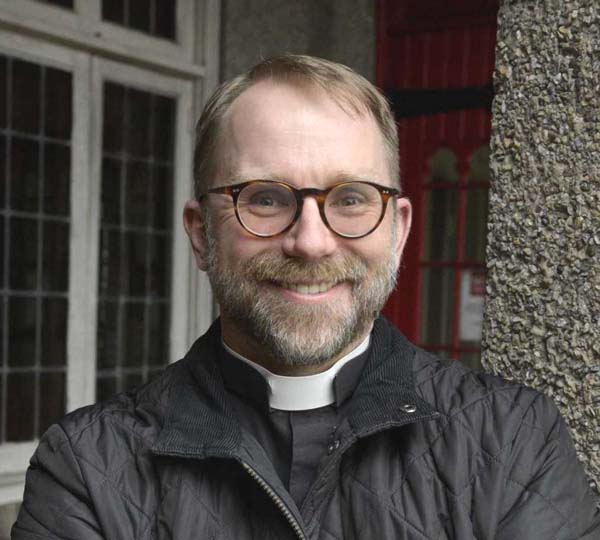
Rev. Dr. Trowbridge
FORUM ON FAITH
Why we should take selfies with those we disagree with.
by Rev. Dr. Trowbridge
Published: September 3, 2022
Danbury News Times
Once about every ten years, since 1867, leaders of the Anglican branch of Christianity from around the world have convened in England for what's known as the "Lambeth Conference." While the majority of those bishops hail from lands that were once colonized and connected by the British Empire, the Anglican Communion now encompasses well over a hundred independent nations and territories. So, those leaders arrive to England speaking scores of unrelated languages, representing diverse social and economic backgrounds, bearing vastly different lived experiences, challenges, and resources. What could possibly go wrong?
As the Lambeth Conference of 2022 approached last month, there was much consternation in church news stories, awaiting conflict on the horizon. Much of the anticipated dissent among the hundreds of bishops expected to attend the Conference focused on the breadth of positions that the various Communion Churches hold regarding the inclusion and participation of LGBTQ members in the life of their congregations. True, Anglicans throughout the world all share a common heritage of worship, they all read and study the same Bible, they all rest their basic beliefs of the same ancient creeds. Yet when it comes to living out that shared faith in their own particular contexts, not everyone totally agrees on what being a faithful Christian of the Anglican variety should look like. So, fears were mounting that the 2022 Conference would descend into some sort of ecclesial brawl, where only one victorious position would emerge.
Was there tension and disagreement at this year's grand meeting? Definitely so. Did everyone leave in agreement over topics and positions that vary broadly from one culture to another? Certainly not. But one thing I noticed that unexpectedly proliferated from the Lambeth Conference this time around was the number of selfies that participants took of themselves with new acquaintances from around the world. Bishops from the United States huddled close and grinned with bishops from South Sudan, bishops from Scotland with those of Brazil, and bishops from India with those of Korea. Despite all their differences, they had spent enough time together face-to-face, speaking and listening to one another, seeking common ground and acknowledging disagreement, that they were willing and able to physically draw near to one another and remember the moment in a photo on their cell phones, moments that they could then share with their people back home. No, they did not agree on all matters. But then again, neither did the first apostles of Jesus, to whom each and every one of those bishops could trace their leadership lineage. It was enough, it was something, that despite their differences, they could stand side-by side, and want to be seen together.
Now that the Lambeth Conference has closed, and as we in our country are making our way through the midterm election season this year, I've been wondering lately if that sort of "selfie phenomenon" might just be a litmus test for how we are doing as a society here in the United States. Yes, we Americans disagree with one another, quite vigorously and adamantly on some topics. But I wonder, could we also hold out hope that we might at least be willing to be seen with, to have a selfie taken beside those with whom we disagree, even if it's just to acknowledge our shared humanity, even if it's just for a fleeting moment? It's become so easy lately to blast out verbal daggers on social media against people whose real names we don"t even know, let alone people we've actually looked in the eye. So, what might it look like for Election Day to be filled with selfies of people who disagree on issues, who vote for different candidates, who espouse different views, but who nonetheless are willing to affirm together that we all want what's best for all of us? What might it feel like to post pictures of ourselves right up next to those we disagree with, as an affirmation that, at the end of the day, we were all born with the same inherent human dignity and worth, that we all deserve fairness and justice, and that none of us should ever be deemed "untouchable." And then, what might it look like, to see that sort of image before our eyes, not as an exception during a major election year, or at some decennial global conference of Anglican bishops, but as a common, everyday part of life? I, for one, will be hoping and working to see that, with my own eyes!
The Rev. Dr. Dustin Trowbridge serves as Rector of St. James' Episcopal Church in Danbury, CT. He may be reached at (203) 748-3561 or welcome@saintjamesdanbury.org.

Rabbi Ari Rosenberg
FORUM ON FAITH
Interfaith Family Values.
by Rabbi Ari Rosenberg
Published: August 20, 2022
Danbury News Times
There is a Jewish tradition that teaches the purpose of all humanity descending from Adam and Eve. It certainly didn't have to happen that way. An omnipotent God could have just as easily created one line of people from one set of ancestors in one location, while also creating other lines of people from different sets of ancestors in other locations. However, both science and scripture teach that all humankind descend from the same family, which begs the question: "why?"
The Jewish tradition teaches that, in God's infinite wisdom, the entirety of humanity descended from Adam and Eve in order to teach that no people, of any particular race, religion, or ethnic group are superior over any other in any way. It was meant to be a lesson to promote embracing diversity, religious plurality, and basic equality among all human beings.
As Executive Director of the Association of Religious Communities ("ARC"), these values are reflected in everything we do. Much of our work is devoted to preventing poverty, homelessness and domestic violence, but one of my favorite parts of the job is the interfaith work that we do.
One of the highlights for me, every year, is running ARC's Interfaith Peace Camp. Each day, we introduce 25 youth to the faith of a different religious tradition. They spend one day at a church, one at a synagogue, one at a masjid, one with a Buddhist abbot, and one with a Native American. We also take the kids swimming, we go on field trips, and we provide full scholarships to any family eligible for SNAP benefits (90% of our campers). The key lesson of each day is focused on learning a different perspective on the value of "peace" in a different religion.
Some people believe that there is only one religious truth: their own. Others believe that all religions are the same. What we try to teach at Interfaith Peace Camp is that all of the religions have more in common than what differentiates them. And, there is also a certain beauty to observing the different perspectives each religion has to offer. I liken it to the way light can shine through a diamond, reflecting a different color from each angle.
`The goal of Interfaith Peace Camp is to promote peace, acceptance, and appreciation of people who come from different faiths. By bringing children to meet real people in the sanctuaries of religious congregations, we are are hoping to break down the barriers of anti-Semitism, xenophobia, and various forms of bigotry.
It's easier to fear and even demonize the "other" when you've never met them or been invited to their spiritual home. Our hope is that these kids take the lessons they've learned, and become role models throughout the community.
Another aspect of the interfaith work we do at ARC is this very Forum on Faith column in the Danbury Newstimes. Twice a month, guest writers describe the role their faith plays in a value they have, a choice they have made, or a perspective they have on a contemporary issue. It's not meant to proselytize or convert people or change anyone's mind in any way, but rather to open people's minds to learn about different experiences and perspectives. Some pieces are written by clergy and other lay leaders, but we also enjoy hearing from the pews of each congregation as well. If you have a story you'd like to tell, something you think might be of interest to the greater community, we'd like to hear from you (contact information below).
One of the best interfaith activities ARC offers is our annual Interfaith Thanksgiving Event. Some years, it has been more of a service. Other years, it has been more of a concert. Every year, it has been an opportunity to show gratitude for the blessings in our lives and to celebrate religious diversity within our community. The last two years, the pandemic has obstructed our plans to gather in person. This year, we are praying we will be able to bring ARC's Interfaith Thanksgiving Event back.
As I reflect upon the opportunity to offer Interfaith Peace Camp, the Forum on Faith, and ARC's Interfaith Thanksgiving Service, I am reminded of how fortunate we are to be living in this generation. Historically speaking, the windows of time are few and far between, when people can learn about and appreciate the wisdom of other religions, without feeling threatened by them or feeling compelled to make everyone view the world the same way. Realistically speaking, religious differences have the potential to lead to violence and war. That's not the fault of the religions themselves, but rather people who exploit religion to serve ulterior motives, like the opportunity to wield power over others.
The essence of religion, however, is love: love for yourself, your family, the people of your faith, the people in your community, the people you know and also the people you don't know. The more we learn about each other, the more clear it is that, though our paths may be quite different, they all lead to the same place.
Just as we all come from the same family, so too is our brightest future one in which we continue to view the world as family.
Rabbi Ari Rosenberg, Executive Director of the Association of Religious Communities (ARC), 203-792-9450 or ari@interfaitharc.org
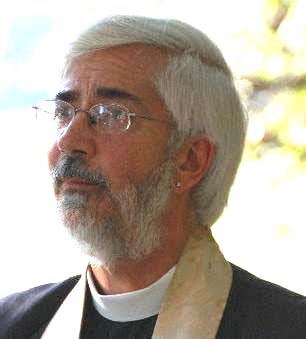
Rev. Dr. Geoffrey Hahneman
FORUM ON FAITH
From expatriates in Europe to refugees in CT, we are 'one'.
by Rev. Dr. Geoffrey Hahneman
Published: August 6, 2022
Danbury News Times
In the late 1980's I was the priest at the "American" Episcopal Church in Waterloo, Belgium, a suburb of Brussels. The congregation was called "American" because in its ten-year history, it had always had an American priest, used the American Book of Common Prayer, and had the American Bishop in Paris as their 'visitor.' Interestingly though, the congregation never had a majority of Americans!
All Saints' Church in Waterloo was full of English-speaking expatriates from around the world. We, of course, had American and English businessmen and diplomats working in Brussels, but we also had French and Belgian widows from the First and Second World Wars. We had four African ambassadors to the European Union, and Anglicans from all over the British Commonwealth. When we celebrated the traditional Nine Lessons and Carols at Christmastide, we had a different English accent for each Reading!
For the last fifteen years of my ministry before retiring in 2019, I was the Rector of St. John's Episcopal Church in Bridgeport, Connecticut. Bridgeport has such a diverse population that none of the neighborhoods or even its voting districts had an ethnic majority, despite being surrounded by suburbs that were 94%-99% white! St. John's was one parish, but has four congregations, and celebrated services each Sunday in English, Spanish, French, and Creole. We had an annual "International Fiesta" where parishioners in native costumes came from all four congregations to share with one another food and drink from their ancestral homelands. It was the best party of the year!
So, after I retired to our home in Kent, I became the part-time priest at St. John's Episcopal Church in Washington, Connecticut. During the pandemic, the seven religious congregations of Washington came together as the Washington Council of Congregations to minister to the urgent needs of our community. We organized food drives, meal deliveries, volunteers at our Warren/Washington Food Bank, sponsored quarterly blood drives for the American Red Cross, and raised funds to support the Community Culinary School of Northwest Connecticut, located in New Milford. Last fall in the midst of the American withdrawal from Afghanistan, we brought the local community together as the Washington Refugee Resettlement Project (WRRP) to organize a refugee family resettlement, inspired by our experienced neighbors at the New Milford Refugee Project (NMRP), both working through IRIS, the Integrated Refugee and Immigrant Services in New Haven and Hartford. In the end, both groups received families from the Turquoise Mountain group of artisans founded by Prince Charles in 2005, and we both rented houses on the same street, so that our families, who already knew each other, could continue to support each other as they adjusted to life in the United States.
As an American who have lived outside the States for significant periods of time in Montreal, Oxford, and Brussels, I know the anxiety of unfamiliarity that comes at once living in a strange land, each place with different habits and behaviors. I also know about the close ties formed by expatriates struggling together to adjust to changes in expected societal norms. But I also know the delight and the sheer joy of meeting new people, experiencing new customs and traditions, and recognizing together our common humanity.
Our two refugee families, each with four children, are settling into their new lives in the United States, with the support of NMRR and WRRP. They are all taking English classes, mostly through the Literacy Volunteers on the Green. The children started public school in April, and have been engaged in summer programs at the Pratt Center and the Village Center for the Arts in New Milford. Living downtown, the families can walk or ride their bikes to get to the grocery stores, pharmacy, and even doctors' offices. They often ride the bus to Danbury for work or to purchase Halal meat and foodstuffs that they miss from home: dates, and nuts, and Mango ice-cream! I have been there, and I remember the delight I experienced when I found a small shop in Oxford that catered to the American students with essential foodstuffs like Cheerios and Oreo cookies, and even Lone Star beer!
The world is a diverse place, with many nations, tribes, and peoples, but we share a common humanity. We are never complete without all the others. And so: E Pluribus Unum, "Out of many, one," our nation's motto as placed on the Great Seal of the United States by an act of Congress in 1782, remains as true today as ever!
The Reverend Dr. Geoffrey Hahneman, Priest-in-charge, St. John's Episcopal Church, 78 Green Hill Road, Washington, CT 06793 Parish Office Telephone: (860) 868-2527 St. John's Email: stjohnschurch@snet.net"
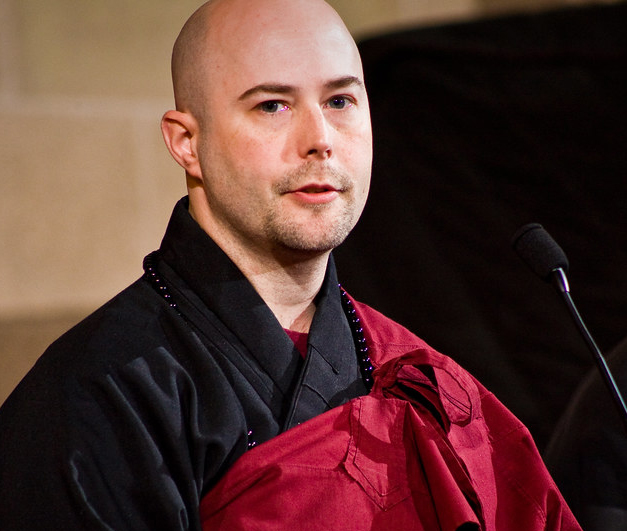
Ocean of Wisdom Sakya
FORUM ON FAITH
The lessons we teach our children in this 'post-ethics' period.
by Ocean of Wisdom Sakya
Published: July 16, 2022
Danbury News Times
I have been contemplating ethics of late as we seem to exist in what years ago I termed a "post-ethics" period. Over the years I have observed a decline of valuing ethics in our society, our businesses, and our government, which of course become the values (or lack thereof) that our children absorb.
As a simple example I was told of a student once who was repeatedly late to the first class of the day. After being held accountable they began arriving with excuse notes from their parent. It was clear the parent was "covering" for their child. The problem here is that by lying for their child the parent was also teaching the child to lie. Learning ethics starts in the family.
Ethics are often thrown aside by businesses for the sake of profit, with little regard of the damage done to human relations and trust.
A relative of mine told me a story of a business meeting that was indicative of the current business attitude. His company, a food business, had a process that generated a by-product, caffeine. His company previously negotiated a "gentleman's agreement" to sell their caffeine to another company. At a meeting that came later within my relative's company it had come to their attention that a new product they were making could use that leftover caffeine.
My relative responded it was too bad they didn't know earlier as the caffeine was promised to another company. Other businesspeople at the meeting asked if any papers were signed, and the answer was no. They suggested then that their company had no obligation to honor the agreement. They felt it was right to withdraw from the agreement because it wasn't a legal one. An argument ensued because my relative stated legality was irrelevant, a word had been given and it was a matter of ethics, not legality. His colleagues considered this an unrealistic business approach.
When I discussed this case with another businessperson they labeled me an "idealist" for believing that ethics should trump legality. I find it odd that being ethical and believing in ethics is somehow now anachronistic; that the expectation that anyone aside oneself behave ethically, is laughable, and the person who is ethical is somehow naive.
However, much to the point the businessperson there is another case where an employee observed another employee engaging in unethical and illegal behavior and counseled the unethical employee against the behavior. The unethical employee then complained to management, and the result, as backwards as can be, was the ethical law-abiding employee was transferred because management felt that the ethical employee's expectation that their workplace be ethical, and lawful, was disruptive to the unethical and unlawful employees.
This same issue occurred to ethical people in finance who called out the unethical practices in their companies just before the 2008 recession. Most of them were either fired or transferred, as their unwillingness to ignore the unethical behavior meant they weren't good "team players" by management. An ethical issue at the level of government occurred years ago when an Attorney General of the US looked at the legality of torturing prisoners; a question that would never arise under a sense of ethical conviction. However, the question was not only asked, but a legal justification was given to allow torture and to suspend human rights, which was done.
Concerning of late is the seeming practice of our political parties only considering something unethical if the other party does it. There is a pattern among the two major parties in the US that if a member of their own party commits an ethical (or illegal) transgression it is explained away or justified, but if a member of the other party engages in the same transgression the torches and pitch forks are out. There was a time when both the parties would hold both their own and other members accountable.
I am heartened that with recent events I have seen people uphold their oaths rather than be dishonest in the name of being a team player. What concerns me here though is how they are being branded "heroic" and "brave." Not because of they aren't, but when did we get to a point in our society where people who are honest are in some sort of peril?
All adults must model and teach ethics to our children, in all environments, if we wish a positive future for them. May you and all beings be well and happy.
Venerable Ocean-of-Wisdom Sakya, Abbot, Middle-Way Meditation Center, venwisdom@gmail.com.
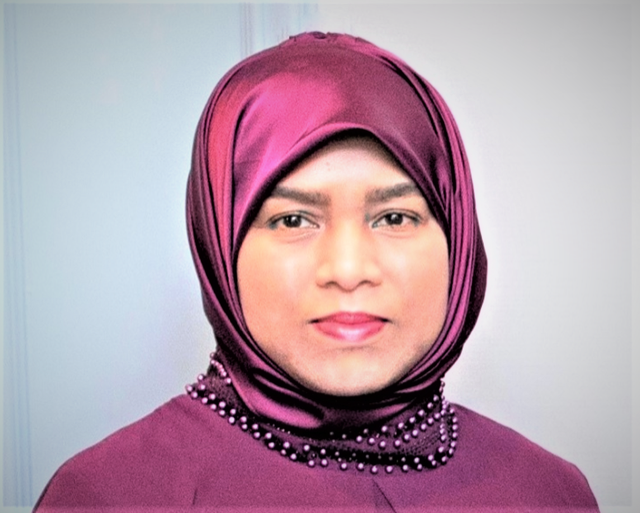
Shazeeda Khan
FORUM ON FAITH
Developing a resilient mindset.
by Shazeeda Khan
Published: July 2, 2022
Danbury News Times
Resilience is having the capability to adapt and recover from setbacks and adversities. Our ability to cope with life's trials will determine how well we endure in this world. Spiritual resiliency can offer us freedom from debilitating stress and worry.
Islamic teachings inform us that this world is the testing phase of our lives wherein we must strive to cultivate spiritual resiliency, i.e., patience. God tells us, ". . . do you think that you shall enter heaven without being tried . . . " [Quran 2:214]. "We will surely test you with something of fear, hunger, a loss of wealth, lives, and fruits, but give good tidings to the patient." [Quran 2:155].
Tests and trials serve several purposes among them are to develop and train good character, to establish morals, and to strengthen submission to God. Submission to God is key because it enables our hearts to fulfil the rights due to ourselves and those of the people. It isn't just that we are commanded to pray, fast and give charity but it's how these rituals changes our hearts and refine our character.
Every situation has benefits for the believer, in times of ease, the believer is grateful to God and in times of trials, the believer exhibits patience and resilience. Therefore, the believer is always living within a state of gratitude or a state of patience which results in humility, generosity, and thoughtfulness.
The good news is even if one is not naturally resilient it is possible to develop a resilient mindset and attitude.
Here are a few ideas that may help in developing a resilient mindset:
Muslims find comfort in this verse of the Quran 2:286, it begins with a promise - God does not burden a soul beyond their capacity, - followed by a supplication - Our Lord do not hold us accountable if we forget or make a mistake. Our Lord do not place a burden as You have place on those before us. Our Lord do not make us bear a burden for which we have no strength, pardon us, grant us forgiveness and mercy on us.
We are also comforted by this statement of Prophet Muhammad, "A believer is not stricken with a discomfort, an illness, an anxiety, a grief or mental worry or even the prick of a thorn but God expiate their sins on account of their patience" [Al Bukhari]. This reminds us that coping with adversities within the limits of God is a means of removal of our sins.
Setting reasonable and realistic goals for ourselves and not overburdening ourselves which may lead to despondency. "God intends for you ease and does not intend for you hardship" [Quran 2:185]. The Prophet advised: "Take up good deeds only as much as you are able, for the best deeds are those done regularly even if they are few" [Ibn Majah].
Begin everything by enlisting God's assistance. Remembering that nothing happens without the Will and Knowledge of God.
Before we make any important decisions, we supplicate seeking God's guidance: God if in your knowledge this action is good for me in my religion, for my belief, for my life and death, for this world and the next, then make it destined for me and make it easy for me and if this action is not good . . . then turn it away from me and turn me away from it and destine for me what is better." Reliance in God removes the worry and anxiety associated with making decisions.
The Prophet said, "Safeguard the Commandments of God and you will find Him before you. Remember Him in prosperity and He will remember you in adversity. Be sure that which have missed you, was never meant for you; and whatever hit you, would have never missed you. Remember that the Help of God is obtained with patience, and relief emerges after distress, prosperity follows adversity, and hardship is followed by ease" [At-Tirmidhi].
People who are resilient have certain characteristics: they view setbacks as opportunities. They have strongly held values, which includes spiritual connections. They maintain perspective; they can see past their current situation. They are self-aware; they understand their strengths and weaknesses. They set realistically achievable goals. They can improvise by shifting gears and developing alternative plans. They exhibit patience in adversity.
Embedded within Islam are principles and duties that enable us to develop spiritual resilience to navigate through life. Our resilience is further strengthen with the knowledge that God's Mercy, Guidance and Forgiveness, is always accessible - resulting in hopefulness, optimism and less stress.
Shazeeda Khan is an Islamic Studies teacher and Director of Islamic Education at Baitul Mukarram Masjid of Greater Danbury at 330 Main Street, Danbury CT.
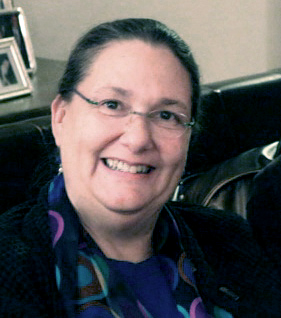
Polly Castor
FORUM ON FAITH
How to foster civility?
by Polly Castor
Published: June 18, 2022
Danbury News Times
To me, civility starts with our common ground as all children of one Creator, not in learning to bridge our differences. In my work as a Christian Science Practitioner, I listen to lots of people of every stripe and type.
No one likes to be stereotyped, and indeed no one fits into a stereotype. Stereotypes are intended to be generalizations, but they egregiously miss their mark more often than they approximate anyone closely. We cannot assume stereotypes are valid, especially since we never feel like they apply to us, so we must stop assuming they apply to others.
I find people are often very insecure. That is usually accompanied by anxiety, mixed with frustrated hope that they'll be validated and accepted. That insecurity plays out in defensiveness, criticism of others, and the camouflaging of their true self, leaving them to masquerade behind protective barriers.
This insecurity results in detachment and hostility- feeling misunderstood and isolated. More importantly, it leaves them in an identity crisis. This crisis of identity is a common theme that I discern behind so many issues. It is not a surprise that we don't understand others, when we understand our own selves so very little.
As I regularly encourage my clients, authenticity is the answer to all of this. Whenever you vulnerably step out in your enlightened authenticity, by that same degree you free other people to do the same.
Yes, we need to be more loving and accepting of people with differing lifestyles, beliefs, politics, and opinions than ourselves, but first we need to love ourselves, and embrace our own true authenticity. Without understanding and honoring ourselves, we can't do it for anyone else.
So how do you begin to embrace your own authenticity? The way I explain it in my work is that we are all made up of Godlike qualities and attributes. The Bible holds the answer when it asserts in Genesis 1 that we are all "made in the image and likeness of God" and as a result, each one of us is "very good."
As you start to identify yourself with the way God created you, you'll become less insecure, for you'll realize you don't have to be the Source of any good, only the outcome or reflection.
I encourage clients to list Godlike qualities and exemplify them in their lives. My list of God-like qualities and attributes includes about 1200, but I"ve been collecting them for a while. Doing so helps give us a bigger, clearer sense of both God and ourselves.
Just for starters, consider expressing universal qualities like mercy, kindness, generosity, delight, creativity, intelligence, caring, conscientiousness, consideration, alertness, assurance, prudence, peace, radiance, virtue, justice, magnanimity, honesty, graciousness, wisdom, diversity, and joyfulness.
Your life becomes better by identifying this way, but the uncanny thing is that it frees everyone else too. What automatically happens is bigger than just civility. As we image forth these things in our own lives, genuine appreciation and recognition of those same attributes are discoverable everywhere, exhibited by others.So when we treat people as Republican, or Democrat, as Gay, or Transgender, or as a Jew, or an Evangelical, as a Christian Scientist, or a Muslim, we limit them into a lie.
For one clear example, what people assume about me as a Christian Scientist is hardly ever correct. We need to get to know each other as the sum of our mutual Godlike qualities. We tell stories to ourselves about each other that are simply not true; let's actually get to know each other instead.
Civility seems daunting when you start with your differences. But when you start with the God-given qualities and attributes we all share, the path forward becomes radiantly clear, and is lit with love.
As a person not afraid to be deeply authentic, it is easy for me to find common ground with anyone. I may not agree with everyone's perspective, but I can respect their integrity as a child of God, and hold each dear one in a space where they can shine.
Isn"t that what we all desire? Isn"t that what we all deserve?
So to foster civility, I would simplify it down to being unabashedly authentic yourself in the highest sense, honor others' highest authenticity as well, and to amplify every good around you and within you.
I believe that can ripple outward and catch on, spreading even more easily than hostility and anxiety, because people crave it. It feels great, and it sustains itself because it is based on the truth of our most primal purpose and connection - the way God made us to be.
By Polly Castor, a Christian Science Practitioner, and member of First Church of Christ, Scientist, Ridgefield, Connecticut. She can be reached at www.pollycastor@gmail.com.
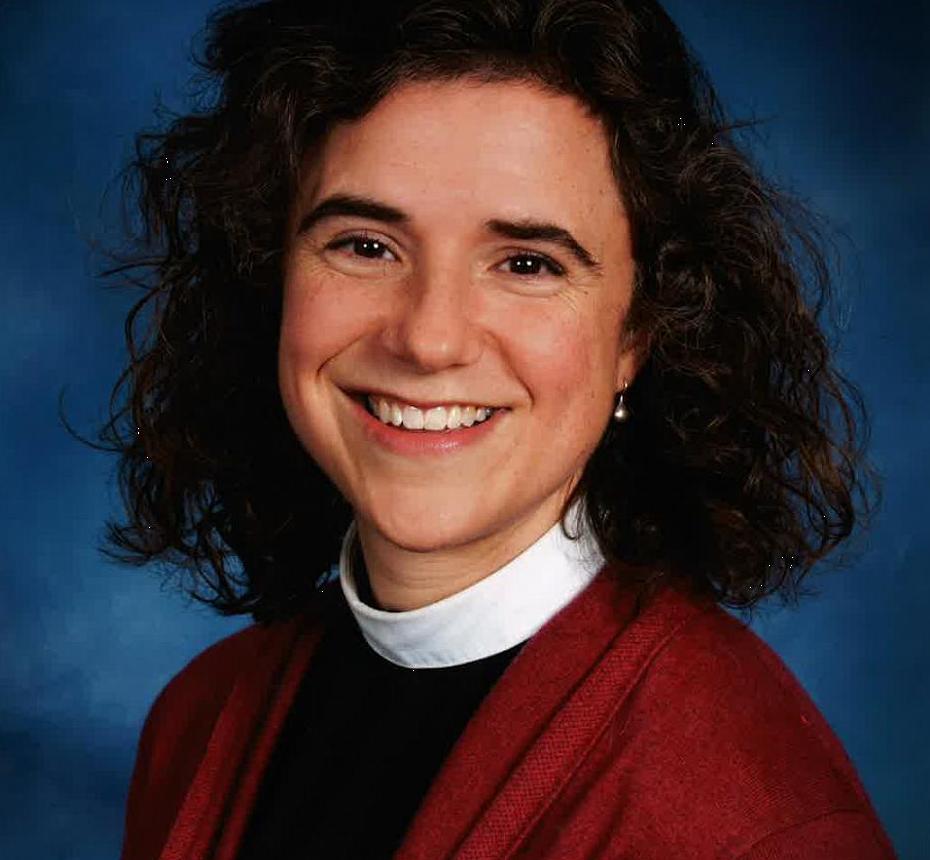
Rev. Whitney Altopp
FORUM ON FAITH
Teachings of Jesus.
by Rev. Whitney Altopp
Published: June 4, 2022
Danbury News Times
The teachings of Jesus in no way support white Christian nationalism. I think that this is important to say because the very words that I use to talk about myself - a Christian - have been used to describe the exact opposite of what it means to be a follower of Jesus.
I have empathy toward anyone who wishes that a New Kingdom would be established. There is so much suffering in the world; many people are oppressed; the changes may feel confusing or threatening in some way; the future seems unclear. I've heard more than one person say, "I wish that Jesus would just come and reign already!" Even if it means the end-of-the-world. For some, the end of the world seems like an option that's better than what we're living through now.
The disciples - the people who knew Jesus during his time on earth - wanted a New Kingdom to be established, too. They were willing to participate in acts of violence and betrayal in order to get Jesus to take the throne and overthrow the Roman government which was occupying Jerusalem and oppressing the Jewish people.
Jesus admonished and corrected them again and again. This violent overthrow of government was not what he came to do. He knew that violence would infinitely beget violence. Such a government would mean that there would be no peace without war - forever. And Jesus wasn't interested in that kind of rule.
The way of Jesus emphasized that the means beget the end. The Kingdom of God that he came to establish was a different kind of kingdom than what we see in earthly rule. The Kingdom of God would come about as people practiced the ways of the Kingdom of God - faith, hope, and love. Those that follow Jesus do this hard work in word and deed and thus make a way for Christ to reign. Doing this hard work will not lead to any one of us sitting on the throne of God's Kingdom.
Nor can we humans initiate God taking the throne on earth. Any of us who have read the Gospels know that violence and betrayal don't lead to God assuming the throne. Peter was violent and Judas betrayed Jesus . . . . both with the hopes (I believe) of seeing Jesus "do his thing"- become the Messiah and establish God's Kingdom on earth. Jesus did not do as they had hoped.
Violence and betrayal only lead to more violence and betrayal. Every part of history shows this to be true. Nowhere in history do we see violence and betrayal lead to an establishment of peace and love. Nowhere.
Christians were given the name of "Christians" by others who saw them practicing the teachings of Jesus, who they identified as the Christ. Only centuries later did an institution spring up with the hopes of building an empire bearing the name "Christian." Empires are always violent, in a desire to keep their reign over difference. And nowhere does Jesus condone this violent activity.
It is my hope that more Christians who do the hard work of following Jesus will say aloud the fact that Jesus did not come to establish an empire. The goal in speaking this truth is not to defend or persuade. The goal is to simply take up time and space with words that will generate a better outcome for us all. Because, I believe, when God sees us caring for one another, God will recognize God's Kingdom on earth and we will see God on the throne.
The Rev. Whitney Altopp, Rector, waltopp@ststephens-ridgefield.org or 203-438-3789, St. Stephen's Episcopal Church, 353 Main St., Ridgefield, CT 06877

Jon Haddon
FORUM ON FAITH
A Great Role Model.
by Rabbi Jon Haddon
Published: May 21, 2022
Danbury News Times
In just a few weeks, Jews all over the world, will be celebrating the holiday of "Shavuot," the time of giving of the Torah to the Jewish people and to the world. On the second day of the holiday, it is traditional to read from the Biblical Book of "Ruth". There are many explanations of why the book is read, especially with its timeliness of the barley harvest, coinciding with the actual time of the year in modern day Israel.
But I believe there is even a deeper meaning. No story in the Bible demonstrates more fully than the Book of Ruth the extraordinary power of love, channeled as hesed - kindness or generosity - that goes beyond the expected obligation.
No book better models what it means to love the stranger and what it means to demonstrate hesed in a way that not only repairs a ruptured family history but also creates a community into which one wants to bring a child.
Megillat Ruth (the Scroll of Ruth) is all about kindness and audacity. Through its depiction of Ruth, her actions and influence, the book illustrates just how one can cultivate such virtues so as to bring about personal and even national transformation. The concluding genealogy weaves this transformation into the larger tapestry of Israel's epic narrative by tying Ruth to David, Israel's most illustrious king.
Sometimes, you can tell a lot about people just by watching them interact with others and studying their body language. It's evident from the Bible account that others knew a lot about Ruth's character just by watching her.
After arriving in Bethlehem, widowed and with no means of providing for herself and Naomi, her mother-in-law, Ruth went out into the fields to pick up the leftover grain - a practice known as gleaning. This was an Israelite law that provided a way for the poor and needy, like Ruth and Naomi, to feed themselves.
As Ruth was gleaning, the owner of the field, whose name was Boaz, stopped by to check on the harvesters. He noticed Ruth and asked the workers, :"Who is that young woman?" The workers replied, "She is the young woman from Moab who came back with Naomi. She asked this morning if she could gather the grain behind the harvesters, and she's been hard at work ever since. She's not stopped except for a few minutes."
Impressed by this hard worker, Boaz told Ruth that she could glean in his fields as long as she wanted. Then, he invited her to eat with the harvesters. Not only that, but Boaz told his workers not to bother her, but to drop even more grain for her to gather. Ruth was overwhelmed, and asked Boaz, "Why are you so kind to me? I'm just a foreigner." And Boaz said, "Yes, I know. But I have heard all about you. I have heard about the kindness and love that you have shown to Naomi since the death of your husband and her son. I have heard that you left your family and have come here to live among strangers."
How Ruth cared for Naomi was obviously the talk of Bethlehem! Even though she was a stranger among them, the people knew she was a kind, loving, and compassionate woman - just by watching her actions! Her reputation had spread so that when the harvesters told Boaz who was in his fields, he had already heard about her.
Ruth's life exhibited admirable qualities. She was hardworking, loving, kind, and faithful. She had gained a reputation for these qualities, but only because she exhibited them consistently. Wherever she went, Ruth's character remained unchanged.
What do our actions say about our reputation? Remember, a good reputation is something we earn when we consistently live out those qualities we believe in, especially if those qualities are love and righteousness.
Rabbi Jon Haddon lives in Danbury and is Rabbi Emeritus, Congregation Shir Shalom of Westchester and Fairfield Counties, Ridgefield. He can be reached at jonrab33@gmail.com.

Polly Castor
FORUM ON FAITH
On Mother's Day, celebrating God as mother.
by Polly Castor
Published: May 7, 2022
Danbury News Times
One of the things I appreciate about Christian Science is the concept of God as Father/Mother. The founder of Christian Science, Mary Baker Eddy, included the idea of God as Mother 150 years ago. It is a mystery to me why so many faith traditions only refer to God as masculine, but I'm grateful to be in a branch of Christianity that has always included the idea of God as Mother.
The first chapter of Genesis clearly states that we are made in God's image and likeness, both male and female. So it follows if we are reflecting God as God's image, God must include both male and female qualities as well.
There are other passages in the Bible that support the concept of God as our Mother.
In Isaiah (66:13) we read, 'As one whom his mother comforteth, so will I comfort you.' The "I" here refers to God speaking to us, expressing the care and solicitousness of a Mother's love.
And I often think of this passage in Deuteronomy, "Like the eagle that stirs up its nest, and hovers over its young, God spreads wings to catch you, and carries you on pinions." When I need support or reassurance, I imagine myself all tucked up under God's nurturing wing, nestled closely among all those feathers, feeling cozy and safe.
In her classic book on spirituality, Science and Health with Key to the Scriptures, Mary Baker Eddy interprets the first line of the Lord's prayer, "Our Father which art in heaven," as, "Our Father/Mother God, all harmonious."
Sometimes when I pray the Lord;s Prayer, I pray more with the idea of Our Mother which art in heaven. I'm bowled over with what a different feeling this gives me.
I grew up in a rather happy, functional family. However, my dad was definitely the king of the roost, as the breadwinner and professional superstar. My mother was a creative artist, who sidelined her life to be a homemaker and mother to three daughters, of which I'm the youngest.
Also in my close family unit were my dad's widowed mother, and my mother's only sister, who was single.
So it was basically my dad and six women. It was a perfect recipe for patriarchy, unwitting as it was. He had no idea of his privilege, but as the youngest of those six women I sure did, and I chafed against it.
When I pray to God as "Our Mother," the feeling reminds me of all my human mother unselfishly did for us, how she was always there for us, how creative she was, how she'd listen to us, or help us with our projects. She'd take our part in any difficulty.
She had a strong sense of integrity, fairness, and morality. She would clearly expect us to behave properly, while easily forgiving our mistakes. She'd make sure we had what we needed. She was a supporter-not afar off and tacit like my dad, who was the big gun brought in at the celebrations and calamities-but a constant, there all in between.
These more reassuring qualities of fidelity and wholehearted presence are so much more helpful to me as I turn to a metaphor for God, than a more traditional fatherhood context, which for me, is fettered not only with a patriarchal sense, but also with a sense of distance and pre-occupation, which feels therefor less intimate and understanding.
I know not everyone has been blessed with a wonderful human mother, so this may not help all of you, but this trade off of one word is working for me powerfully right now. It feels fresh and encouraging.
So this Mother's Day, I'm celebrating God as Mother. I'm rejoicing in a whole range of strong but often under appreciated feminine qualities of God like abiding graciousness, gentle approval, attentive faithfulness, perceptive listening, ample flexibility, resplendent loveliness, magnanimous devotion, mild patience, delightful impartiality, warm generosity, and perpetually proficient care.
Indeed, I believe each of us is the divine Mother's cherished offspring, upheld, provided for, guarded, guided, and governed. I'm all snuggled up into the embrace and unconditional love of that divine Mother-love, which wants the best for everyone, yearns for a genuine relationship with each of us, and will do whatever is necessary to make everything come out just right.
Polly Castor, a Christian Science Practitioner, and member of First Church of Christ, Scientist, 260 Main Street, Ridgefield, Connecticut 06877. She can be reached at pollycastor@gmail.com.
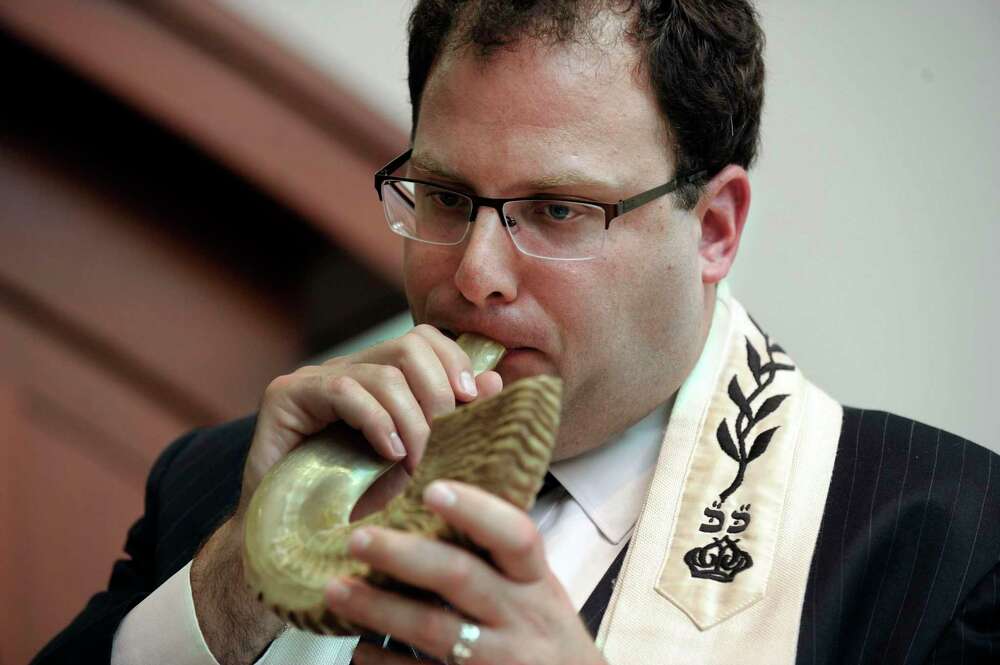
Rabbi Ranier
FORUM ON FAITH
A visit to a migrant shelter is a reminder to welcome the stranger.
by Rabbi David Reiner
Published: April 16, 2022
Danbury News Times
In March 2019 I traveled to El Paso, Texas and Ciudad Juarez, Mexico to witness conditions on the United States-Mexico border. Three years later, after many changes in our world, I returned to the border region, visiting a migrant shelter in San Diego, again witnessing the brokenness of the immigration system in our country. In preparing celebrate the Jewish festival of Passover, detailed in the book of Exodus, I will explain to my children (as written in Exodus 13:8) "this is because of what the Eternal did for me when I went free from Egypt."
The story of Passover is the ultimate story of human migration. The ancient Israelites fled oppression and violence, seeking safety and opportunity. As a Jew, as a United States Citizen, as a member of the human family, I believe in our fundamental responsibility to welcome the stranger.
My beliefs are rooted in our Scriptural tradition: the audacious hospitality of our patriarch Abraham, described in Genesis 18 is a model for my sacred work. When strangers approached, Abraham ran to greet them. The preceding verses suggest that Abraham was recovering from a major medical procedure (at the age of 99) when he rushed to greet approaching strangers and welcome them into his tent. Elsewhere in Scripture (Leviticus 19:18) we are commanded to "love your neighbor as yourself" and in Numbers 15:15 we are reminded that citizens and strangers are the same before God. Thirty-six times in the pentateuch we are commanded to support the stranger, widow, and orphan. None of these commandments are dependent upon immigration status.
My beliefs are shaped by familial experience: four generations ago my family fled violence, antisemitism, and scarcity in Eastern Europe hopefully seeking safety and opportunity in the United States. My experience is not unique; how many of our families came to America fleeing persecution or seeking safety and opportunities for a better life? HIAS (the Hebrew Immigrant Aid Society), one of nine official refugee resettlement agencies recognized by the United States government and the United Nations, has a tagline: We used to support refugees because they were Jewish; now we support refugees because we are Jewish.
My beliefs are informed by personal experience. Today I am blessed to lead and worship with congregants who fled persecution in foreign lands, arriving in the United States seeking freedom of religion, freedom from oppression. When I walk the streets and woods of Ridgefield and Danbury carrying or holding hands with our seven and two year old, I think of the detained families I witnessed along our nation's southern border, carrying or holding the hands of their young children behind barbed wire fences, seeking the freedom and safety I enjoy without fear. And I think of the parents I witnessed in an ICE detention center, facing civil charges, awaiting deportation hearings, unable to hold the hands of their children. When I read from Psalms I remember the bedside Bibles opened to the book of Psalms at a shelter/dormitory for unaccompanied minors in El Paso, psalms expressing a hope for a better future, and I am struck by the similarities and differences in my hopes and the hopes of someone fleeing violence and oppression.
This March, informational signs in the shelter we visited were written in English, Spanish, Haitian Creole, and Russian, reflecting the origins of most clients. A Russian family arrived during our visit. They fled St. Petersburg, afraid of what would happen because they opposed the Russian government. Because EU countries were closed to Russian airlines they transited Tajikistan, Turkey, and Amsterdam before flying to Mexico, requesting asylum upon entering the United States. We were told that an increasing number of clients were arriving from Russia and Ukraine, seeking safety from violence and war.
I believe a person cannot be "illegal." An individual may have entered the United States without permission or appropriate documentation; calling a trespasser "illegal" dehumanizes and denies agency, and ignores the complexity of human migration. After witnessing conditions on our border I am amazed by the simplicity and complexity of systems and processes for non-citizens, migrants, asylum seekers, and refugees to enter our country. And, as I reflect upon what I witnessed, I am reminded of my obligation to welcome the stranger. Whether we are welcoming a family fleeing the fear of war in Ukraine, the fear of political oppression in Russia, the fear of gang violence in Central America, or the fear of scarcity anywhere in the world, I believe in our responsibility to teach ourselves and our children what was done for us in generations past. Nearly all of us came to the United States of America seeking freedom and safety with a responsibility to share those opportunities.
Rabbi David L. Reiner, Congregation Shir Shalom of Westchester and Fairfield Counties. 46 Peaceable Street, Ridgefield, CT 06877. RabbiReiner@OurShirShalom.org or 203-438-6589
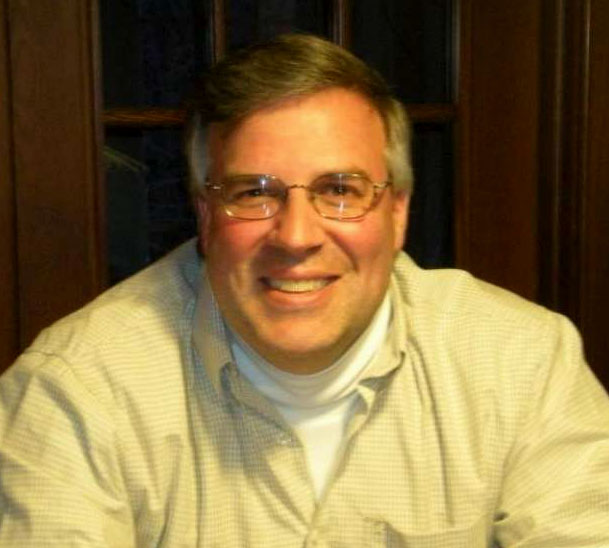
Paul Gervais
FORUM ON FAITH
The challenge and importance of keeping the faith
by Paul Gervais
Published: March 26, 2022
Danbury News Times
We've all heard it over the years when things get tough and we don't quite
know if we are going to pull through, "keep the faith." While it is advice we should / want to
take seriously, let's admit it is not always easily to accept.
Life is a series of ups and downs. When we are on the ups, nothing appears to be able to stand in our way; life is good. It's easy during the easy times to express our gratitude to God and sing his praises. But when things are not so good, our song changes; the "why?" and "why me?" come to our lips quicker than "Thank you." We can tend to be "fair-weathered" in our faith.
It is not that we want to abandon all hope or belief, but it is a struggle. Having lived through a pandemic (which may still be lurking about), the current unsettling events in the Ukraine, not to mention our own personal life struggles, I think we can all admit keeping the faith is easier said than done. How many of you have caught yourself looking skyward (the heavens) and simply asked, "why?" I know I have many times. And for those of you who have it under control and can't relate, all I can say is "God bless you."
But take heed all of you who are like me; we are not the first, nor it is safe to say, will we be the last. When googling how many Bible verses there are about "keeping the faith" I found one site indicating at least 100 verses that exist. From Hebrews, Ephesians, Psalms, Philippians, to John and Mark, and many more, all speak of maintaining faith. Even artists the likes of Billy Joel, Bon Jovi and Michael Jackson have produced songs on "keeping the faith."
I read a testimonial where the writer mentioned his father having said, "the Christian life is not a parade but a battle." And while that may sound a bit harsh, I have to admit it rings true. For Christians, our very core is based on believing in God. But while that is true, we were never promised that our life would be easy. Lynn Anderson, for those who can remember, once sang a song, "I Never Promised You a Rose Garden" where one of the lyrics is, "along with the sunshine there's gotta to be a little rain sometime."
During this season of Lent and the upcoming Passion Week, it is a good time for anyone to take time and reflect. Christians may reflect on the suffering we believe Jesus endured for our salvation and how this should serve as a basis to sustain our faith in a not so easy time.
Despite all the adversities Jesus encountered during his life, and exponentially during his passion, Christians believe Jesus kept the faith in his Father, our God. Yet, we must recall that as noted in the gospel of Matthew 27:46 he tells us that in the ninth hour Jesus cried out, "My God, my God, why have you forsaken me?" This certainly could be viewed as Jesus feeling abandoned by his Father, and therefore questioning him. But that is not the case.
In Jesus' cry to his Father some interpret this as his taking on our feelings of abandonment; our forsakenness. If we continue to keep our faith in God, we will never feel abandonment. Christians believe that Jesus' resurrection from the dead on the third day shows that God never did, and never would, abandon his son, as he will never abandon us.
I must be honest that as I am writing this, I find myself thinking, "wow, this sounds so easy." So why do I find myself saying "why?" more often then I sometimes want to admit? If my faith is as strong as I think it is then, why? And like I have said to my kids many times when asked, "why?" . . . BECAUSE! Because, plain and simple, it is not meant to be easy.
So, when times are their toughest dig deep and pray your hardest and believe and trust. And if you are still struggling, remember there are 100+ references to faith, and keeping the faith, in the Bible, and even pop artists have introduced "keeping the faith" in their song lyrics. And if all else fails, remember, "you were never promised a rose garden", and oh yeah . . . "Keep the Faith!"
Paul Gervais is from the First Congregational Church of Ridgefield at 470 Main St. Ridgefield, CT 06877
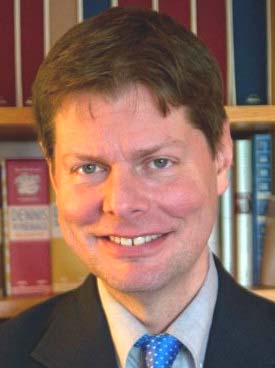
Thomas Stubbs
FORUM ON FAITH
Lent, the 'Ghost of Kyiv,' and finding hope.
by Rev. J. Michael Cobb
Published: March 12, 2022
Danbury News Times
Less than 48 hours after the Russian assault on Ukraine, a folk hero was born. As an overwhelming military force invaded, stories began to circulate about the Ghost of Kyiv. This unnamed individual was said to be an exceptional fighter pilot, who had engaged far superior Russian planes in aerial combat, single-handedly bringing down six of them. This is unheard of, and if true would be the first time such a thing had happened since the Second World War. The pilot was named the Ghost of Kyiv for appearing out of nowhere to defend their country, and then vanishing just as quickly once the task was done.
There is no evidence this Ghost is a propaganda hoax, nor is there any proof that he exists, but this doesn't seem to matter. The Ghost of Kyiv has become a very powerful symbol of hope, to a people who face odds that leave little room for hope. As I've read about the Ghost, my favorite comment about him from an unnamed Ukrainian was this: "If he is real, may God be with him; if he is fake, I pray for more like him."
This story about an unnamed resistance fighter arose just a few days before the beginning of the Christian season of Lent. During this time, Christians are encouraged to engage in active reflection - on our souls, our actions, and our relationships with God, with the church, and with one another. Some people give up enjoyable practices during Lent as a way to encourage more frequent, active contemplation, with abstinence from chocolate, or alcohol, or even social media being common.
As if that wasn't enough, Lent begins and ends with a focus on mortality. For many Christians, this includes clergy putting ashes on your forehead while speaking words most commonly used at a funeral. The ashes are applied in the shape of a cross, our most powerful symbol of our faith. In the middle of all that focus on death and mortality, we are reminded of hope that persists through everything.
Intentionally contemplating one's mortality can be challenging, and as we enter the third year of a worldwide pandemic, many of us have been contemplating mortality to a great degree. And yet, Christians do this with a reminder of hope at the center of it all. Once Lent is underway, it is no longer on one's forehead for all the world to see, but the intent is to keep in your heart the reminder that hope persists, no matter what. Kind of like an avenging fighter pilot, striving against impossible odds, yet refusing to give up.
This year, I am mindful of how the season of Lent overlays everything else happening in the world. As I write this, mask mandates are beginning to relax. The sensible precautions we were following when Lent began will likely no longer be necessary at its end. The weather is getting a little warmer, feeling like winter is finally giving way to the spring. Like many churches, my congregation will celebrate the end of Lent with an Easter morning worship service held outdoors, unthinkable just a few weeks ago but likely to be warm and beautiful when we reach that point.
While Lent focuses on mortality, it always ends the same way, in a celebration of new life and new beginnings that we call Easter. Perhaps it is easier to turn one's attention to somber matters when we know with certainty that it will end in joy and light. When you know for sure where things are going, it is easier to put your faith and trust into a humble ashen symbol of hope. As I write this, no one knows what will be the outcome for the Ukrainian people. I do know that in a time characterized by incessant partisanship and bias, most of our nation, even most of the world, has united in support of the Ukrainian people. Against the odds, hope persists.
In writing this, I learned that more than 70% of Ukrainians are Christian, a higher percent of the nation than in the United States, so many Ukrainians are also observing Lent while fighting this invasion. I pray that the hope that is such an important part of this time is an encouragement to them. Churches have become accustomed to gathering online during the pandemic, bringing faraway believers into community. Like all religions, believers share a bond with one another, no matter how distant they are from one another. The lesson of Lent is that hope persists, even in the face of grim odds, and I pray that it many help sustain Ukraine during this time when it is so urgently needed.
Rev. J. Michael Cobb is pastor of the Woodbury United Methodist Church, and resides in Danbury with his family.
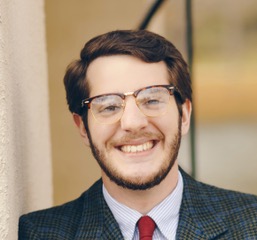
Thomas Stubbs
FORUM ON FAITH
Lent: A Time for "Making Sure"
by Thomas Stubbs
Published: March 5, 2022
Danbury News Times
Once, when I was a kid, I asked a pastor at my church what the season of Lent was all about. I knew part of the answer involved a tradition where everybody had to "give up" something from Ash Wednesday until Easter Sunday. That "something" was usually an indulgence of some sort - chocolate was a common choice among folks my age. Year after year, I'd dutifully deprived myself of one thing or another for the season's duration, but the idea of giving something up seemed arbitrary to me, and I couldn't see what laying off sweets for a month and a half had to do with God or church.
I knew another part of the answer involved what our Sunday morning liturgy had to say about Lent: that it was a time to "acknowledge the ways in which we have fallen short of the glory of God and repent of our sins," and to "anticipate the resurrection of Jesus Christ, whose victory over sin and death has given all the world a share in the promise of eternal life." I adored the grandeur of these words, but their meanings mostly escaped me. One only hears words and phrases like "repent," "sin," "resurrection," and "eternal life" in church, so if nobody there tells you what they mean, individually and altogether, then you're stuck.
I was hoping the person who stood up front in stately vestments and spoke those words out loud every Sunday morning could help me understand all this. He could, and he did, but not in the way I was expecting. He didn't try to convince me that giving up chocolate for a few weeks was an act of profound heroism, and he didn't repeat the words of our Sunday morning liturgy, only more slowly this time so I'd understand. Instead, he gave me a new answer. It was short and to the point. "We all worship something, Thomas," he said. "Lent comes around every year to help us make sure that 'something' is God."
Not everybody worships God, of course, but I think the wisdom of that pastor's words can be extended beyond the physical boundaries of a particular house of worship or the doctrinal boundaries of a particular creed. By "we all worship something," the pastor meant that we all have activities, occupations, and beliefs to which we give our time, energy, and devotion. Because we give all that to them, these pursuits tend to become very strong influences upon us, shaping the way we see the world and our place in it, informing us as we make decisions and set priorities.
This can all be well and good, if we're aware of the hold these objects of "worship" have upon us. If we are, then we can temper and regulate their influence, secure in our sense of how much space each one takes up in the big picture of our lives. What that pastor taught me all those years ago when he said "Lent comes along to help us make sure . . . "was that it's not only possible, but common, for us to fall into "worshipful" habits without knowing it, to give ourselves over to influences which are all the stronger for our not realizing how totally they've consumed us. The purpose of Lent-style reflection is to take a step back from our lives as we think we've arranged them so we can see what's slipped in under the radar and started running things without asking us first.
I'm now a pastor myself, so I think of Lent in terms of all those church-speak words that I listed above, words for which I can now provide definitions. Even so, every time this season comes around, I always come back to that pastor's advice about making sure I'm worshipping what I think I'm worshipping. The God revealed in Jesus Christ is who I mean to worship, but whatever beliefs and commitments give shape and purpose to your life, I invite you to join me in giving the big picture a once-over this season. Whether you observe Lent or not, it's never a bad idea to do a little spring cleaning. "Lent," after all, means "Spring."
Thomas Stubbs is the Associate Pastor of Jesse Lee Memorial United Methodist Church in Ridgefield.
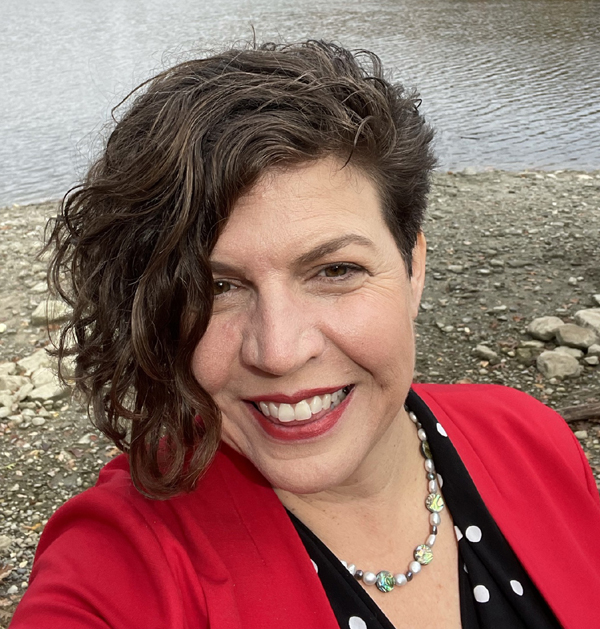
Rev. Amy Carter
FORUM ON FAITH
"Why we should ask 'Am I Being Horrible Right Now?'"
by Rev. Amy Carter
Published: February 19, 2022
Danbury News Times
Recently I have been finding inspiration in John Pavlovitz's book, "If God Is Love, Don't Be A Jerk: Finding A Faith That Makes Us Better Humans." Pavlovitz has produced a thoughtful critique of American Christianity with a large dose of humor and a dash of salty language. As a devout Christian himself, the author's purpose is to call people and the Church itself to consider how layers of culture are preventing us from living the faith as Jesus intended. He muses about founding a new church, called The Church of Not Being Horrible where, "The central question at any given moment . . . Am I Being Horrible Right Now?"
Am I Being Horrible Right Now? is a question that adapts well to short attention spans and hectic lives. Right Now removes the need to remember the events of the full day in order to examine them, and instead challenges a believer to consider themselves in the moment. Right Now is perfect timing in the age of social media when a snapshot or a scene the length of a Tik Tok video may be the only event by which you are measured. Asking the question in the moment implies correcting it with immediacy - if I am being horrible right now, clearly I should stop right now!
The trickier portion of the question is understanding what Horrible means. Intuitively we all know certain horrible behaviors when we see them - temper tantrums, violence, shouting matches and other behaviors that are considered rude are quickly identified. Unfortunately, simply being polite does not avoid all the pitfalls in human interactions or faith communities. If it did, Pavlovitz would never have imagined The Church Of Not Being Horrible.
To avoid horrible behavior, we must move beyond the surface of good manners and more deeply reflect. Pavlovitz posits that it is the "blind spots of privilege, prejudice and ignorance" that are the source of many of our failings. It would seem that avoiding horrible behavior requires a better understanding of the lives of people who are quite different from you.
I believe that the reason that many of us, Pavlovitz included, treasure gathering regularly in a faith community is that we are provided an opportunity to build relationships with people we might otherwise not encounter. At First Congregational Church of New Milford I have been enriched to know a dizzying diversity of people including: champion pie bakers, retired military personnel, delivery drivers, engineers, nurses, teachers, social workers, farmers, entrepreneurs, new grandparents and childfree adults, individuals of varying races, ethnicities, family composition, and global travelers. They all gather for one reason: they are faithful Christians answering the call of Jesus to love God and love another.
In this time of pandemic, gathering and socializing has been complicated for many of us. Churches have had to become more flexible, worshipping in reduced numbers, online and foregoing fellowship time for the safety of all. At this stage, most of the faithful are yearning to get back together and getting restless.
For some of us, this isolation is making us a bit more horrible because we have not had the benefit of sharing our thoughts and lives with others in the usual way. We have clustered in the same pods and small groups for almost two years, and fatigue has sapped our patience and in some cases, our manners. We have moved about physically and emotionally distant with covered faces hiding our interactions.
Most of us are eagerly looking forward to the day when we hang our masks up and life settles back into a more familiar pattern. We cannot know when this will happen, but as we follow declining numbers and become hopeful, maybe this can be a time of preparation. Maybe this is the perfect time to get into the habit of asking Pavlovitz's question: Am I Being Horrible Right Now?
For more information on the book select this link:
www.johnpavlovitz.com/if-god-is-love-dont-be-a-jerk"
Would you like more information on the Daily Examen? Select this link:
www.ignatianspirituality.com/examen-prayer-card"
Rev. Amy Carter is the Pastor of First Congregational Church (UCC) of New Milford.
36 Main St., New Milford, CT 06776
Revcarter@nmchurch.org or www.nmchurch.org
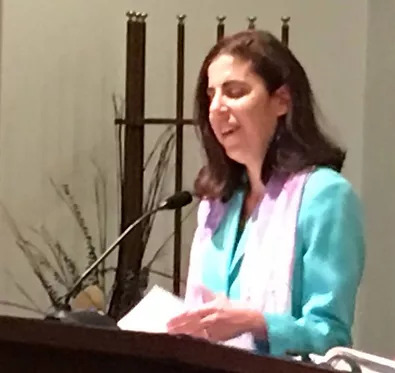
Cantor Laura Breznick
FORUM ON FAITH
"What we learn from the Jewish 'Birthday of the Trees' festival"
by Cantor Laura Breznick
Published: January 29, 2022
Danbury News Times
From the evening of Sunday January 16th - Monday January 17th Jews around the world celebrated one of the lesser known festivals on the Jewish calendar called Tu Bishvat. Tu Bishvat is known as the New Year or Birthday of the Trees. It is, as I wrote, a minor festival. The name is Hebrew for the 15th of the Hebrew month of Shevat.
In ancient times, Tu Bishvat was simply a date on the calendar that aided Jewish farmers in establishing exactly when they should bring their fourth-year produce of fruit from the recently planted trees to the Temple as their first fruit offerings.
In the 16th century, the Kabbalists (mystics) of Tzfat in the Land of Israel came together to create a new ritual around this minor festival which they called the Feast of Fruits. This Feast was modeled on the Passover seder. Folks would come together to read selections from the Torah and Rabbinic Texts that focused on the trees and consume fruits and nuts traditionally associated with the land of Israel.
Today, this festival is seen as a time to celebrate not only the fruit of Israel but the middot (values) of shomrei adama (caring for the environment) and bal tashchit (do not destroy). The festival allows us to come together as a community and celebrate these values as caring for the world we live in and keeping it (and us) safe is a core value in Judaism.
This year, of course, this festival had the unfortunate reality of following on the heels of the recent events at Congregation Beth Israel in Colleyville, Texas. On the Shabbat before Tu Bishvat four hostages (including the congregation's Rabbi) were taken hostage by a man named Malik Faisal Akram, a UK national who called for the release of Aaifa Siddiqui, a convicted terrorist with links to Al Quaeda who rallied against Jews at her trial and blaimed her conviction on Israel.
As I expressed to my own congregants in the days following the attack, "This situation is a painful and potent reminder of the fact that synagogues, and other Jewish institutions, in America continue to be at risk for terrorist attacks. We must take this seriously, however, it doesn't mean that we should stay away."
On the contrary, in moments of grief and fear, this is when we need our community most of all (albeit virtual due to the ongoing pandemic). Around this time of year on the Jewish calendar, when we are celebrating renewal and safety, we are obligated to continue on and celebrate. To take pride in our Judaisim. To live Jewish lives with purpose.
You may be asking, how can we be expected to keep the environment safe when there is no guarantee that we can keep ourselves safe? This is a fair question. I wish I had the answer. It is something I ask myself regularly. The one thing I know doesn't work is, trying to do it all alone. In this time of uncertainty, it is imperative that we draw strength from one another.
It was ecologist Suzanne Simard, a professor of forest ecology at the University of British Columbia, who discovered that the roots of deep trees draw up water and make it available to shallow-rooted seedlings. They help neighboring trees by sending them nutrients, and when the neighbors are struggling, mother trees detect their distress signals and increase the flow of nutrients accordingly. They are "social creatures" that communicate with each other in cooperative ways that hold lessons for us humans, too.
Like the deep roots of those trees, we too are connected. May we continue to learn from the environment that surrounds us. To remain connected, no matter what. To stay strong, no matter what. To keep going, no matter what.
Cantor Laura Breznick of the Temple Sholom in New Milford, CT She can be reached at cantor@tsholom.org.

Rabbi Ari Rosenberg
FORUM ON FAITH
"Danbury's moral Imperative to House the Homeless"
by Rabbi Ari Rosenberg
Published: January 15 , 2022
Danbury News Times
As the Executive Director of the Association of Religious Communities, one of the shared values I see in all religions is a moral imperative to help those who are genuinely unable to help themselves. In a recent letter to the editor, dozens of Danbury religious leaders cited Jewish, Christian, Muslim and Buddhist scripture in support of the shelter operated by Pacific House at the former Super 8 Hotel. There are currently over 80 souls residing there, with dozens of Danbury residents waiting to get in. After exhausting all other legal options, the shelter's doors remain open only by virtue of Governor Lamont's emergency powers, which are set to expire February 15.
To be clear, the City of Danbury is facing an urgent crisis of unprecedented proportions. In one month, Danbury's only remaining Homeless shelter will be forced to close its doors, flooding Main Street with Danbury's entire homeless population, in the dead of winter.
This is a housing crisis, this is a health crisis, this is a moral crisis. I say this without judgment of anyone, but rather to raise awareness about our collective moral imperative to do something about it immediately. How will we want to see ourselves, when we look back on this moment years from now?
In years past, there were several small shelters in town that each did their part to serve the homeless community. Dorothy Day Hospitality House, Jericho Partnership, the City Shelter and various overflow locations collectively sheltered about 100 homeless individuals on the coldest nights of the winter. All of these shelters are out of operation, either due to zoning issues or the fact that congregate housing is not covid-safe. The question is, come February 15, when there isn't one single shelter left in Danbury, where are we going to put Danury's homeless population of at least 100 people?
The fact of the matter is that we could end homelessness in Danbury entirely, if we only had enough affordable housing. Shelters play an important role as a temporary solution, but Danbury hasn't got a single shelter left. We can get vouchers to cover the cost of placing Danbury's homeless population into affordable and supportive housing. Rather than being concentrated in one area, they could be spread out over the whole town, in safe residences, with case managers working assiduously to connect them with services and employment opportunities. The problem is that the vouchers only cover up to a "Fair Market Rent" established by HUD. What landlord would rent a single-bedroom apartment at HUD's $1,412 price point, when they could get $2,000 on the free market from a commuter recently relocated from New York?
There are, in fact, some serious advantages to providing affordable housing. First of all, there is the virtue of housing the homeless, which literally saves lives. Secondly, unlike taking a chance on someone whose employment could be lost at any moment, most clients on vouchers come with support from NGO', who can help ensure the rent gets paid no matter what. There have been times, for example, when ARC has paid a client's rent, to keep the landlord whole, while we help the client find a new job.
Beyond the advantages of affordable housing, there are also disadvantages when a city falls below affordable housing benchmarks. Under CT Statute 8-30g, if Danbury's affordable housing stock falls below 10% of our total housing stock, then new affordable housing developments could circumvent local zoning regulations. Danbury recently fell from 12% to 11% affordable housing. With households growing at 1.5% while the population is growing at 6.6%, Danbury is on a trajectory to fall below 10% affordable housing very soon.
Meanwhile, in the wake of the eviction moratorium expiration, a rising tide of evictions has flooded the market. Without more affordable housing for these families, Danbury's homeless crisis will surely be exacerbated.
The only way to solve this problem is to increase Danbury's affordable and supportive housing stock. If every landlord in Danbury offered one or two units at the HUD "Free Market Rent" for vouchers, we could knock out Danbury's entire homeless population while simultaneously increasing Danbury's affordable housing stock, not to mention, the value of doing a truly "good deed". If every home with a vacant in-law unit were to rent that out to one of these clients, it would have a big impact. If every religious congregation were to support the landlords in their communities, helping them to reduce their rent to accommodate clients with vouchers, this would make a huge difference. If developers were to add to Danbury's affordable housing stock, we could fill those units overnight.
There are infinite solutions to the crisis we are facing. The one thing we cannot do is to put our heads in the sand and pretend that Danbury is not facing an urgent crisis of homelessness and affordable housing. At present, there is no plan to accommodate Danbury's homeless population. When the Governor's emergency powers expire, and Danbury's only remaining homeless shelter is forced to close its doors one month from today, what will we do to ensure there is a safe place for every lost soul? The clock is ticking.
Ari Rosenberg, Executive Director of the Association of Religious Communities (ARC), 24 Delay St., Danbury, CT. 06810. He can be reached at: 203-792-9450 or execdir@arcforpeace.org